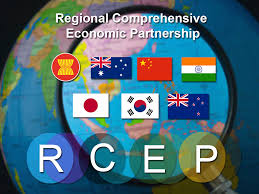Bangladesh has taken up the initiative to join Regional Comprehensive Economic Partnership (RCEP) to retain duty benefits once it makes the United Nations status graduation from a least developed country to a developing one in 2026.
An inter-ministerial meeting agreed that the county will join the RCEP, an agreement comprising the world’s largest trade bloc led by China, if an opportunity is created after negotiations, said the commerce ministry.
“So, we discussed different aspects of a study on joining to the RCEP conducted by the Bangladesh Trade and Tariff Commission (BTTC),” said Tapan Kanti Ghosh, senior secretary to the commerce ministry, yesterday.
Seeking opinion from different ministries and departments concerned is the beginning of the process and the BTTC suggested joining the initiative, he told after the meeting held at the ministry.
Ghosh could not exactly state what trade benefit Bangladesh would gain joining the RCEP. The Daily Star is yet to obtain a copy of the BTTC study.
So, in the near future, Bangladesh may send a formal letter expressing interest to join the trade bloc if there is political agreement within the country and if the RCEP’s terms and conditions allow inclusion of a new member, said Ghosh.
In fact, it is important for Bangladesh to sign the agreement with the RCEP as the country also needs to join the global value chain to retain duty benefits after the LDC graduation, he said.
Earlier, Bangladesh had not shown any interest in joining the RCEP to safeguard its revenue generation from duties on imports.
On the other hand, none of the would-be RCEP signatories asked Bangladesh to join their ranks prior to its launch in November 2020.
China initiated the RCEP as a free trade agreement among itself, the 10 Association of Southeast Asian Nations (Asean) states and Australia, India, Japan, South Korea and New Zealand.
India later refused to join the RCEP. The negotiations were formally launched at an Asean summit in Cambodia in November 2020.
In 2017, prospective RCEP member states accounted for a population of 3.4 billion or 45 per cent of the world’s population and about 40 per cent of world trade.
The total gross domestic product (GDP) amounted to $49.5 trillion, more than half of which is made up of that of China and India, surpassing the combined GDP of Trans-Pacific Partnership (TPP) members in 2007.
On January 23, 2017, US President Donald Trump signed a memorandum that stated withdrawal of the country from the TPP, a move which is seen to improve the chances of success for the RCEP.
According to estimates by the PricewaterhouseCoopers, the GDP of the RCEP member states is likely to amount to nearly $250 trillion by 2050.
Bangladesh has been lobbying with major trading partners and economic blocs for signing free trade agreements, comprehensive economic partnership agreements and preferential trade agreements.
It has been focused on retaining duty benefits as the local exporters will face anything from 8 per cent to 12 per cent in duties after the status graduation. And the country may lose $7 billion worth of exports in a year because of erosion of preferential duty benefits for the LDC graduation, according to different studies.







One Response
Bangladesh with Bangla speaking 300 million consumer and its aspiration running high since Bengal Delta had its Trade route linked to Greek if not earlier legacy, but for even all Commonwealth British trade and Customs legalities were framed here but later Lloyd’s catapulted to England, thus Tushar Ghose might have thrown such card rightly.